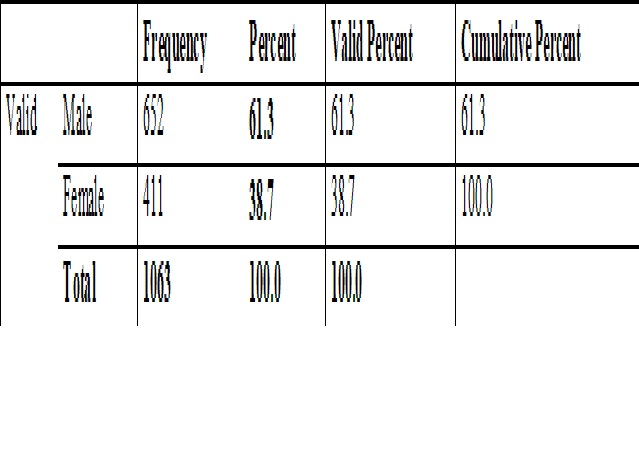Familial clustering and presenceof maternal influence on the transmission of type 2 diabetes in South Indians
Abstract
Type 2 diabetes mellitus (T2D) is a chronic metabolic disorder, characterized by hyper glycaemia caused by impaired glucose homeostasis and represents a serious public health problem. T2D is a multi-factorial disorder depending on complex interactions between environmental factors and genetic variants.
Objective: To evaluate the degree of familial aggregation and maternal influence on the transmission of type 2 diabetes in the South Indian population.
Methodology: A total of 1063 subjects with type2 diabetes with knowledge of history of presence or absence of diabetes in relatives were randomly recruited. 652 were male and 411 were female.
Results: This study showed familial clustering and maternal transmission in our study population. 78.3% of the subjects had at least one relative with diabetes. Familial aggregation was significant with presence of diabetes in 1st degree relative like parents and in siblings. 2nd degree relatives too had significantly associated with diabetes to a similar extent like 1st degree relatives.Patient’s age range between 50-59 showed highest incidence of diabetes at 44% followed by 37% in age group 40-49. Our study showed an advancement of incidence of diabetes by one decade compared to similar studies in different regions.
Conclusion: Maternal factors do play an important role in the incidence of diabetes, prevalence of diabetes. Several factors may be involved in this in terms of polycystic ovaries, gestational diabetes, malnourishment during pregnancy, and other socioeconomic factors. We need studies and further research in ascertaining the exact mechanisms. Familial aggregation is common and may help us to screen for diabetes in high risk populations. Preventive strategies for type 2 diabetes should be directed at these high risk groups.
Downloads
References
Zimmet P, Alberti KG, Shaw J. Global and societal implications of the diabetes epidemic. DOI: https://doi.org/10.1038/414782a.
Zimmet PZKelly West Lecture 1991. Challenges in diabetes epidemiology--from West to the rest. Diabetes Care. 1992 Feb;15(2):232-52.
Lin T, Chou P, Lai MS et al. Direct costs-of-illness of patients with diabetes mellitus in Taiwan. Diabetes Res Clin Pract. 2001 Nov;54 Suppl1:S43-6.
Abid A, Amrouch C, Ben Hassine A, Jamoussi H, Bousetta A, Blouza S, Nagati K. Indirect cost of diabetes in Tunisian diabetic population. InDiabetologia 2003 Aug 1 (Vol. 46, pp. A434-A434). 175 FIFTH AVE, NEW YORK, NY 10010 USA: SPRINGER-VERLAG.
Medici F, Hawa M, Ianari A, et al. Concordance rate for type II diabetes mellitus in monozygotic twins: actuarial analysis. DOI: https://doi.org/10.1007/s001250051132.
Zimmet P, Dowse G, Finch C, et al. The epidemiology and natural history of NIDDM--lessons from the South Pacific. Diabetes Metab Rev. 1990 Mar;6(2):91-124.
Erasmus RT, Blanco EB, Okesina AB, Arana JM, Gqweta Z, Matsha T. Importance of family history in type 2 black South African diabetic patients. Postgraduate medical journal. 2001 May 1;77(907):323-5.
Lee SC, Pu YB, Chow CC, et al. Diabetes in Hong Kong Chinese: evidence for familial clustering and parental effects. Diabetes Care. 2000 Sep;23(9):1365-8.
Knowler WC, Pettitt DJ, Savage PJ, Bennett PH. Diabetes incidence in Pima indians: contributions of obesity and parental diabetes. Am J Epidemiol. 1981 Feb;113(2):144-56.
Klein BE, Klein R, Moss SE, Cruickshanks KJ. Parental history of diabetes in a population-based study. Diabetes Care. 1996 Aug;19(8):827-30.
Karter AJ, Rowell SE, Ackerson LM, et al. Excess maternal transmission of type 2 diabetes. The Northern California Kaiser PermanenteDiabetes Registry. Diabetes Care. 1999 Jun;22(6):938-43.
Young, C. A., Kumar, S., Young, M. J., & Boulton, A. J. (1995).Excess maternal history of diabetes in Caucasian and Afro-originon-insulin-dependent diabetic patients suggests dominant maternal factors in disease transmission. Diabetes Research and Clinical Practice, 28(1), 47–49.
De Silva SN, Weerasuriya N, De Alwis NM, De Silva MW, Fernando DJ. Excess maternal transmission and familial aggregation of Type 2 diabetes in Sri Lanka. Diabetes research and clinical practice. 2002 Dec 1;58(3):173-7.
Arfa I, Abid A, Malouche D, Alaya NB, Azegue TR, Mannai I, Zorgati MM, Rayana MC, Ammar SB, Blousa-Chabchoub S, Romdhane HB. Familial aggregation and excess maternal transmission of type 2 diabetes in Tunisia. Postgraduate medical journal. 2007 May 1;83(979):348-51.
Viswanathan M, McCarthy MI, Snehalatha C, et al. Familial aggregation of type 2 (non-insulin-dependent) diabetes mellitus in south India; absenceof excess maternal transmission. DOI: https://doi.org/10.1002/(SICI)1096-9136(199603)13:3%3C232::AID-DIA27%3E3.0.CO;2-7.
Poongothai S, Anjana RM, Pradeepa R, et al. Prevalence of depression in relation to glucose intolerance in urban south Indians--the ChennaiUrban Rural Epidemiology Study (CURES-76). doi: https://doi.org/10.1089/dia.2010.0081.
Cox NJ. Maternal component in NIDDM transmission. How large an effect? Diabetes. 1994 Jan;43(1):166-8.
Mitchell BD, Kammerer CM, Reinhart LJ, et al. Is there an excess in maternal transmission of NIDDM? Diabetologia. 1995 Mar;38(3):314-7.
Groop LC, Tuomi T. Non-insulin-dependent diabetes mellitus--a collision between thrifty genes and an affluentsociety. Ann Med. 1997 Feb;29(1):37-53.
King MC, Lee GM, Spinner NB, et al. Genetic epidemiology. Annu Rev Public Health. 1984;5:1-52.
Freinkel N.Banting Lecture 1980. Of pregnancy and progeny. Diabetes. 1980 Dec;29(12):1023-35.
McCarthy M, Cassell P, Tran T, et al. Evaluation of the importance of maternal history of diabetes and of mitochondrial variation in the development of NIDDM. DOI: https://doi.org/10.1002/(SICI)1096-9136(199605)13:5%3C420::AID-DIA97%3E3.0.CO;2-W.
Knowler WC, McCance DR, Nagi DK, Pettitt DJ. Epidemiological studies of the causes of non-insulin-dependent diabetes mellitus. Causes of diabetes: Genetic and environmental factors. 1993 Nov 2:187-218.



 OAI - Open Archives Initiative
OAI - Open Archives Initiative


